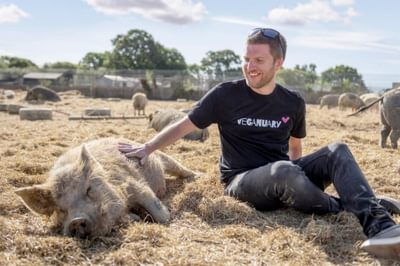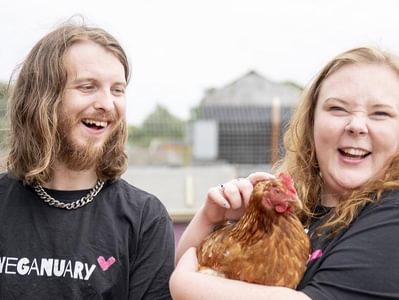
It’s that time of year when we start thinking about the changes we can make to improve our lives and the world around us. Is your resolution a vegan revolution? If you’re planning to rise to the Veganuary challenge, you’ll be contributing not only to your own wellbeing but to the health of the planet too. But can you, as an individual, really make a difference? It’s a yes! The fact is, if everyone made a small change, the impact would be huge.
In the last decade, the number of people in the UK following a plant-based diet has risen by 340%. Half a million people are playing a part in the fight against global warming in the UK alone, just by altering their diet. Food is responsible for over a quarter of global greenhouse gas emissions, and meat and dairy make up the vast majority of that carbon footprint. By switching to a plant-based diet, we can reduce global greenhouse gas emissions by 14.5%.
The BBC reports that this is roughly equivalent to the exhaust emissions of every car, train, ship and aircraft on the planet. One person eating vegan just one day a week can save around 40lbs of grain, which could feed hungry populations around the world, 1,100 gallons of water and 30 square feet of forest.
If we all went vegan, the world’s food-related emissions would drop by 70% by 2050 according to a recent report on food and climate in the journal Proceedings of National Academy of Sciences (PNAS).
The carbon footprint of food

How does taking part in Veganuary reduce your carbon footprint? Put simply, a plant-based diet requires less water to produce. As well as the vast amount of water required to produce meat, livestock farming pollutes water sources when animal waste ends up in waterways.
Livestock-based food production alone is responsible for about a fifth of global greenhouse gas emissions. Almost 80% of all agricultural land is used for growing corn, wheat and soy to feed livestock. As the global meat market grows, so does livestock farming, threatening biodiversity and leading to the destruction of wildlife habitats. In short, more animals need more crops and water to feed them, which leads to deforestation, pollution, land degradation and water scarcity.
Small steps = big change
Becoming vegan doesn’t have to be dramatic. You can do it gradually, making small changes, slowly. Think about what you’re adding to your diet, rather than what you’re avoiding. Start by phasing out meat, fish and poultry, without increasing your consumption of eggs and dairy, and focus on including more plant-based protein sources. Then introduce more whole grains, beans, legumes, tofu, nuts, and seeds and then start phasing out dairy and eggs. Once you’re comfortable, you can take a closer look at the food you’re consuming and make informed decisions about your next steps.
So, you’ve decided to take the plunge. Which foods should you embrace and which should be struck off the shopping list?

Bring on the peas
You can’t beat a vibrant green pea soup, bursting with flavour and colour. Peas are healthy and tasty and thrive in the UK climate, using minimal water because they’re grown in cooler conditions, and they’re a ‘regenerative’ crop as they replace enriching nitrogen in the soil.
Banish the beef
Beef has the most significant environmental impact of any single food. It takes roughly 1,800 gallons of water to produce one pound of edible meat. Beef requires around 20 times the amount of land and generates more than 20 times the number of greenhouse gas emissions per gram of edible protein than plant proteins.
Chuck the chicken
Chicken manure is replete with salmonella, antibiotics, ammonia, and heavy metals and pollutes nearby rivers and streams, harming both humans and other animals.
Farewell fish
Oceans are suffocated with plastic from discarded fishing nets. Not eating fish reduces the demand for fishing, increases bio-diversity in the oceans and prevents harm to other species at risk of extinction.
Go vegan, go green
If you’re considering going vegan for your health and the wellbeing of the environment, you’re on the right path to making big changes by taking small steps. So, get on board with Veganuary, embrace those tasty tofu burgers and enjoy the boost to your body, mind and conscience.
